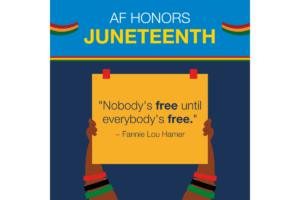At Achievement First, we deeply believe in ensuring that our teachers and scholars are successful in the classroom. To deliver on this commitment, we provide every teacher in every subject with Daily Lesson Resources. We sat down with Ashlyn Razzo to learn more.
Thanks for connecting with us, Ashlyn! What was your path to working in education and joining Achievement First?
I’m originally from New York and went to high school in Spanish Harlem. I had a teacher, Jesse Corburn, who was a first year TFA Corp Member. He was my rock, my mentor. School became an escape for me. Mr. Corburn supported me throughout high school—he even came to my karate tournaments.
When I graduated from high school, I had an idea that I wanted to do something similar in service to my community. In college, I majored in biology and theater. Senior year came, and I got into TFA and went to Miami to teach 10th grade biology. My first year was hard, but it made me realize the things that needed to change for me and my kids to be successful.
During my second year, I felt invigorated. I attended a fundraising dinner, and the woman who sat next to me also knew Jesse Corburn (small world!), and she put us back in touch.
I called Jesse, and he said he was founding a school and wanted me to come teach with him. When I went to visit, it was amazing to see his influence—everything I remember loving about his class was there in the school. Looking back, it’s why I became a strong educator. I worked there for 4 years, and then joined Achievement First so that I could broaden my impact beyond my one classroom.
And we’re glad you’re here! Tell us about your role and Daily Lesson Resources.
I’m an associate director for science achievement for grades 5-12, with a specific focus on supporting grades 11 and 12. My role includes working on curriculum, developing Daily Lesson Resources (DLRs), designing assessments, and leading professional development to implement the curriculum.
At their root, DLRs are lesson plans. They provide a framework that teachers can use to push kids toward our shared vision for their growth and learning. DLRs tell the story of a lesson, starting with an aim and lesson-driving question, and a way to assess if kids get there by the end of class. We provide resources aligned to the unit and yearly vision, key vocabulary, and criteria for success.
One common misconception about DLRs is that they’re a script. They’re not. We provide a framework for teachers to start from, and then it’s left to them to do the prep to internalize the lesson and tailor it to meet the needs of their students. I run weekly lesson planning calls to help with this.
How do you prepare to write a DLR?
It starts with the unit plan—way before I sit to write it. Then, I do a lot of research and think about what’s happening with scientific phenomena and current events. I ask myself “Would this be exciting to learn? What content can be woven in? Will there be labs, case studies, models?” Ultimately, I plan around the skills that scholars need to master to be successful in the unit and those that follow.
Why provide DLRs?
Teachers have a such a hard job—there are so many things to do. When I was teaching, I’d go home and work six more hours. I struggled to plan my lessons because I had no place to start. I would’ve done anything to have something like this when I was teaching.
I’m so passionate about DLRs because we’re giving teachers the tools to build from so that kids can become better scientists, and not just pass an exam.
Do you have a favorite lesson or topic?
My favorite types of lessons are the ones that push me (and our scholars!) to think more critically about science. One recent example is a lab that asked scholars to build a model with beads to explain meiosis through argument driven inquiry. It’s cool because even I come away learning something new.
That sounds amazing—thanks, Ashlyn!
Are you passionate about curriculum and interested to contributing to our Daily Lesson Resources? Ashlyn’s team is hiring—check out our Network Support Careers page to learn more.





